Arundel
Arundel (/ˈærəndəl/ ARR-ən-dəl or locally /ˈɑːndəl/ AHN-dəl) is a market town and civil parish in the Arun District of the South Downs, West Sussex, England.
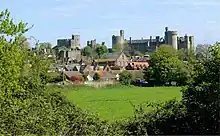

| Arundel | |
|---|---|
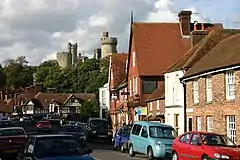 Town overlooked by castle | |
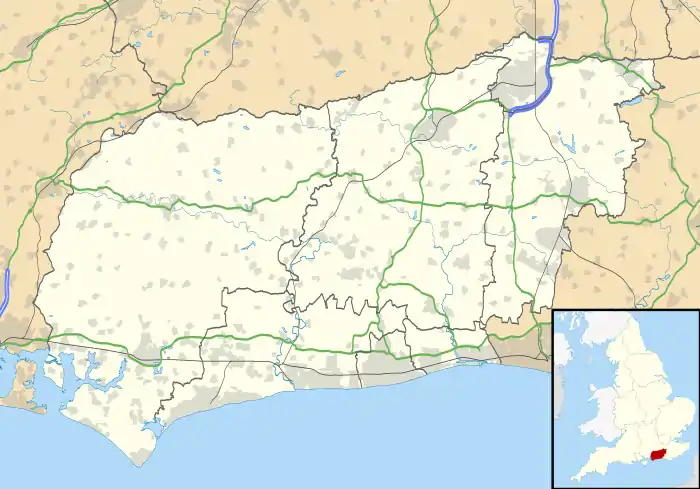 Arundel Location within West Sussex | |
| Area | 12.13 km2 (4.68 sq mi) [1] |
| Population | 3,475 (civil parish, 2011)[2] |
| • Density | 286/km2 (740/sq mi) |
| OS grid reference | TQ018070 |
| • London | 49 miles (79 km) NNE |
| Civil parish |
|
| District | |
| Shire county | |
| Region | |
| Country | England |
| Sovereign state | United Kingdom |
| Post town | ARUNDEL |
| Postcode district | BN18 |
| Dialling code | 01903 |
| Police | Sussex |
| Fire | West Sussex |
| Ambulance | South East Coast |
| UK Parliament | |
The much-conserved town has a medieval castle and Roman Catholic cathedral. Arundel has a museum and comes second behind much larger Chichester in its number of listed buildings in West Sussex. The River Arun runs through the eastern side of the town.
Arundel was one of the boroughs reformed by the Municipal Reform Act 1835. From 1836 to 1889 the town had its own Borough police force with a strength of three.[4] In 1974 it became part of the Arun district, and is now a civil parish with a town council.
Name
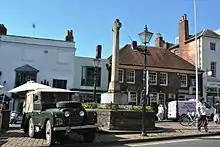
The name comes from the Old English Hārhūnedell, meaning "valley of horehound", and was first recorded in the Domesday Book.[5][6][7] Folk etymology, however, connects the name with the Old French word arondelle, meaning "swallow", and swallows appear on the town's arms.
A further possible etymology derived from the Domesday spelling Harundel[8] comes from the Anglo Saxon hærn[9] dell[10] meaning "tidal valley", which this would mean that the name of the river Arun probably also derives from "tidal". Other local rivers such as the Rother, deriving from the Anglo Saxon róðer which means "rower" (as in a long river), are also descriptive of the river and its surrounds.
A more speculative, esoteric connection has been sometimes drawn by linguists like Theo Vennemann (via the Vasconic substrate hypothesis, and in this case cognate to Basque haran, "valley") to towns like Val d'Aran in, France, Ahrntal in Austria, and Arendal in Norway.[11][12]
Governance
An electoral ward of the same name exists. This ward stretches north to Houghton with a total population at the 2011 census of 4,298.[13] Arundel Town Council is based at Arundel Town Hall.[14]
Geography
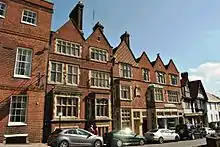
Arundel civil parish occupies an area somewhat larger than its built-up clusters, with the old town towards the north and the new to the south, separated by a main road.[15]
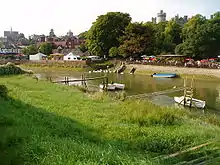
Arundel town is a major bridging point over the River Arun as it was the lowest road bridge until the opening of the Littlehampton swing bridge in 1908. Arundel Castle was built by the Normans to protect that vulnerable fairly wooded plain to the north of the valley through the South Downs. The town later grew up on the slope below the castle to the south.[16] The river was previously called the Tarrant and was renamed after the town by antiquarians in a back-formation.
Arundel includes meadows to the south but is clustered north of the A27 road, which narrowly avoids the town centre by a short and congested single carriageway bypass. Plans for a more extensive, HQDC bypass were debated intensely between 1980 and 2010 and a junction was built for it at Crossbush. In Spring 2018, Highways England published their preferred route for the new bypass.[17] During 2018-19 there is a further period of consultation when views on a more detailed design for the four-mile (six-kilometre) dual carriageway will be sought.
Arundel railway station is on the Arun Valley Line. The Monarch's Way long-distance footpath passes through the town and crosses the river here, while just under five miles (eight kilometres) north and northwest of the town the route of the South Downs Way runs.
The town itself lies outside the boundaries of the South Downs National Park.
Society
Arundel is home to Arundel Castle, seat of the Duke of Norfolk; and to Arundel Cathedral, seat of the (Catholic) Bishop of Arundel and Brighton.
On 6 July 2004, Arundel was granted Fairtrade Town status.[18]
People born in Arundel are known locally as Mullets, due to the presence of mullet in the River Arun.[19]
Arundel is home to one of the oldest Scout Groups in the world. 1st Arundel (Earl of Arundel's Own) Scout Group was formed in 1908 only a few weeks after Scouting began.[20] Based in an HQ in Green Lane Close, it has active sections of Beaver Scouts, Cub Scouts and Scouts.
Sport and leisure
Arundel has a non-League football club Arundel F.C. which plays at Mill Road.
The town also has its own cricket ground at the castle, often cited as being one of the country's most picturesque.[21] It hosts Sussex County Cricket Club for a number of games each season.
Notable people
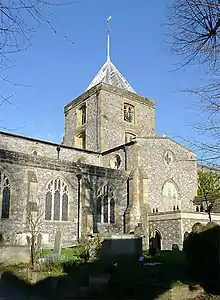
- Christopher Alexander, architect.[22]
- Mary Chater, composer, Music Advisor to the Girl Guides and Justice of the Peace for Arundel from 1945 to 1961.[23]
- Nigel Cumberland, author.[24]
- Derek Davis, potter and painter.[25]
- Judy Geeson, actress.[26]
- St Philip Howard, 20th Earl of Arundel, part of the court of Queen Elizabeth I and a martyr for the Catholic faith.[27]
- Amelia Frances Howard-Gibbon, teacher and artist, was born in nearby Littlehampton and lived at Arundel as a child.[28]
- C. E. M. Joad, Philosopher and broadcaster, wrote many books at South Stoke Farm near Arundel.[29]
- George MacDonald, pastor of Trinity Congregational Church, 1850.[30]
- Liam Treadwell, jockey.[31]
See also
- Amberley Working Museum
- An Arundel Tomb, a poem by Philip Larkin
- Arundel Museum
- Earls of Arundel
- Roger de Montgomery (died 1094), also known as Roger the Great de Montgomery
- Fitzalan Chapel
- List of places of worship in Arun
- Portsmouth and Arundel Canal
- South Marsh Mill, Arundel
- Sussex in the High Middle Ages
- Tortington
- WWT Arundel
References
- "2001 Census: West Sussex – Population by Parish" (PDF). West Sussex County Council. Archived from the original (PDF) on 8 June 2011. Retrieved 26 March 2009.
- Key Statistics; Quick Statistics: Population Density Archived 11 February 2003 at the Wayback Machine 2011 United Kingdom census Office for National Statistics Retrieved 21 November 2013
- "Arundel Town Council Website". Arundel Town Council. Retrieved 28 July 2021.
- Neville Poulsom, Mike Rumble and Keith Smith Sussex Police forces; a pictorial history from 1836 to 1986 (Middleton Press) (1987) ISBN 0 906520 436
- "Open Domesday: Arundel". Retrieved 19 November 2022.
- Hanks, Patrick; Hodges, Flavia; Mills, A. D.; Room, Adrian (2002). The Oxford Names Companion. Oxford: the University Press. p. 1011. ISBN 0198605617.
- "Key to English Place-names". kepn.nottingham.ac.uk. Archived from the original on 29 June 2021. Retrieved 18 July 2021.
- "Open Domesday - Arundel".
- "hærn". Bosworth Toller Anglo Saxon Dictionary online.
- "dell". Bosworth Toller Anglo Saxon Dictionary online.
- Nierfeld, Theo Vennemann gen (20 July 2011). Europa Vasconica - Europa Semitica. Walter de Gruyter. ISBN 978-3-11-090570-0.
- Setyan, Vahan (29 December 2017). Armenian Origins of Basque: The Linguistic Verdict. Lulu.com. ISBN 978-1-387-42094-0.
- "Ward population 2011". Archived from the original on 4 March 2016. Retrieved 13 October 2015.
- "WElcome". Arundel Town Council. Retrieved 17 April 2022.
- "Parish Headcounts, Area: Arundel CP". Neighbourhood Statistics. Office for National Statistics. 2001. Archived from the original on 12 June 2011. Retrieved 5 April 2008.
- Arundel Castle, Schedule Ancient Monument and Grade I listed building Historic England. "Details from listed building database (1012500)". National Heritage List for England. Retrieved 5 May 2014.
- "A27 Arundel Bypass Preferred route announcement" (PDF). Highways England. Archived (PDF) from the original on 17 July 2018. Retrieved 16 July 2018.
- "Fairtrade town status". Archived from the original on 7 March 2008.
- "Facts about West Sussex". West Sussex County Council. 23 October 2006. Archived from the original on 8 June 2009. Retrieved 28 March 2009.
- "Forward! Once more..." (PDF). Newsletter Issue 1. Arundel Scout Group. January 2008. p. 1. Archived from the original (PDF) on 9 March 2012. Retrieved 16 March 2009.
- "Cricinfoengland". Archived from the original on 25 July 2008. Retrieved 16 March 2008.
- "Professor Christopher Alexander". International Who's Who. Retrieved 27 April 2022.
- "Bird flew in the face of the law". Littlehampton Gazette. Littlehampton, U.K. 23 September 1955. p. 2. Retrieved 21 September 2021.
Miss Mary Chater, a magistrate, drew the chairman's attention to the blue-tit
- "Planning Application". Arundel Town Council. Retrieved 27 April 2022.
- Cooper, Emmanuel (13 September 2008). "Derek Davis: Eclectic painter and potter". The Independent. Archived from the original on 20 November 2010. Retrieved 13 September 2008.
- "Judy Geeson". Classic Movie Hub. Retrieved 27 April 2022.
- Pollen, John Hungerford. "Ven. Philip Howard." The Catholic Encyclopedia. Vol. 7. New York: Robert Appleton Company, 1910. 4 Apr. 2013
- Edwards, Gail; Saltman, Judith (2014). Picturing Canada: A History of Canadian Children's Illustrated Books and Publishing. University of Toronto Press. p. 22. ISBN 978-1442622821.
- "Memories of Prof CEM Joad". Sussex World. 4 February 2013. Retrieved 27 April 2022.
- "George MacDonald". Wheaton College. Retrieved 19 June 2018.
- "Grand National winner Liam Treadwell offered chance to fix teeth for free". The Telegraph. 23 April 2009. Archived from the original on 26 April 2009. Retrieved 6 August 2018.
External links
- Town Council
- Arundel in the Domesday Book
